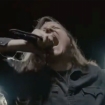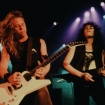"Any day that I get to talk to TL is a good one," gushes Darkest Hour guitarist and co-founder Mike Schleibaum, as we wait for At the Gates frontman Tomas Lindberg to join us on the phone. Though Schleibaum is a metal veteran in his own right—D.C.-based metalcore heroes Darkest Hour have been in business for nearly two decades, and their excellent self-titled new album is their eighth—he sounds just as geeked right now as his teenaged self probably did when he first discovered At the Gates' Slaughter of the Soul LP back in 1996.
"Slaughter of the Soul is my fucking jam," he enthuses. "I mean, I realize they have other records, but I'm religious about that one." Now that the Swedish masters—who reunited in 2007 after an 11-year hiatus—are finally following up that landmark blast of melodic death metal with the excellent new At War with Reality, Schleibaum has a whole list of things he's dying to ask Lindberg. And Lindberg, when he finally rings up, is more than happy to answer them, as well as stroll down memory lane with Schleibaum about some of their shared touring experiences.
MIKE SCHLEIBAUM So, I have this creepy list of questions that I wanted to ask you, now that you're back in the game. [Laughs] Did the Internet shape your thinking at all, in terms of what's happening now with At the Gates? Or have you just tried to be just exactly the same band you were before?
TOMAS LINDBERG I think we're pretty much thinking the same way we always have. I think that's our only way of thinking, really, because that's how we were growing up. [Laughs] The Internet is just a bonus! For a lot of people, it's the other way around—the Internet is the first thing. You see the people on the tram, on the bus, with their necks down on their fucking iPhones, but I'm the guy who's still looking out the window.
SCHLEIBAUM Yeah, there are bands these days who just exist on the Internet—they don't play many shows, they don't exist like bands used to exist. And you guys are old-school about it. To get all you guys in a room, to get everybody's schedules together, that must have been quite an effort!
LINDBERG It wasn't that bad, you know? Once we figured out that we wanted to do the record, that was the first thing on the schedule. Everything else had to wait. [Laughs] That's what we've been doing the last year: just hanging out and writing songs, mostly me and Anders [Björler, At the Gates guitarist]. We actually live in the same city, so it wasn't really that hard to get together.
SCHLEIBAUM I love Anders—he's just, like, a silent little guitar hero, you know what I mean? He's, like, the dude who shows up with a Simpsons T-shirt and the best riffs, and everybody's just like, "Fuuuuuck!" [Laughs] I'd read that Anders started the whole process by presenting you guys with some demos… But you're saying that you and Anders actually sat down and wrote songs together?
LINDBERG Well, he did that solo record [2013's Antikythera], it was kind of a jazz/ambient record…
SCHLEIBAUM Yeah, that record's awesome, by the way!
LINDBERG That's what he did right after he left The Haunted. He told me that he was so tired of metal by then. [Laughs] But after that, all of a sudden, he had some riffs for a song, and he was like, These might be At the Gates riffs—they don't sound like Haunted riffs. Let me show them to Tomas and see what he thinks! This was just like the embryo of a song. I said, "Yeah, try to write some more and see where it's going." And then he presented two more skeletons of songs, and we were like, "This might be something we should look into." We sat down and started to arrange these three songs, and then all of a sudden Jonas [Björler, Anders' twin brother and At the Gates bassist] started writing some riffs and sending them over… After two or three weekends of sitting down, we had like embryos of seven or eight songs, and we figured, "Let's try to do this!"
SCHLEIBAUM Did you put Slaughter of the Soul on at any point while writing the record and go, "Oh fuck, we don't have a song as good as any of these yet"? Or did you just go, "The past is the past, and this is who we are now"?
LINDBERG Basically, on the strength of Anders's first stuff, we just thought, Let's just write and see where this takes us. We knew anyway that when people heard that we were making a new album, they would paint a picture in their heads of what it would look like and sound like.
SCHLEIBAUM I know—I wrote it in my head already! [Laughs]
LINDBERG Yeah! I mean, you love Slaughter of the Soul, and maybe that's what you want the record to sound like. And maybe somebody older, they're like, "Oh, the first record was their best one!" To try to second-guess ourselves based on all that would be mad. So we tried just to write what we write, while having the At the Gates sound in our head. I mean, we've been playing At the Gates shows again since 2008, and have probably played more shows since then up to now than we did back during the first round, from 1991 to 1995. We kind of shaped our sound again. We wanted this record to sound like us playing the old songs live.
SCHLEIBAUM I think about all that it took for you guys to come around and do this—you did it for yourselves, but you also did it for the fans! We wouldn't let it go. We all loved these albums so much that we all hounded you in every one of your other bands, asking, "What's up with At the Gates?" And now you guys are putting out the album. It's time to fucking pay attention, you know what I mean? [Laughs]
REVOLVER Mike, do you remember the first time you heard At the Gates?
SCHLEIBAUM It was during this awesome era around 1996 where we were going through this wave of discovering all of these incredible metal records which were popping up at Tower Records in D.C. All of my punk and hardcore friends weren't sure at first if At the Gates was some weird-ass white-power shit, like Burzum or something! [Laughs] But we got a whole bunch of those albums, and Slaughter of the Soul was one of them. Dude, it cut like a knife, because the first song has a chorus! So much metal didn't speak to me because it just wasn't catchy. And I get how pissed At the Gates is, but to me, it was always about how the vocals flowed against the riffs—and it also had this dark, industrial sound, so it was modern. I was like, "Holy fuck!" It was like the perfect blend, and it was so important in terms of where metalcore went.
LINDBERG I remember back in the day when all those metalcore bands started coming out—so many of them were more focused on the melodic parts, and making it more kind of clean. But those first three Darkest Hour records have the grittiness that we tried to portray. There are gruff vocals, but they are rhythmical against the riffs, and there was a lot of aggression with the melody—not just being melodic and nice. So that's why I always said Darkest Hour got it, but other bands didn't! [Laughs]
SCHLEIBAUM See, the cool thing for me about music is that it's not sports—I don't have to pick sides. I love the melodic Gothenberg sound, too, but to me, Slaughter of the Soul was the bridge. The funny thing is, I never saw At the Gates live until you reunited and we did that tour together in 2008. So I never really got how death metal you were until I saw you—and then, fuck, it made so much sense. I missed the point, at first! [Laughs] I was wondering, was there anything from where we're from that influenced you? When you were a kid, did you have any impression of the D.C. scene?
LINDBERG Oh yeah, of course! A lot of American hardcore and punk in general was a very integral part of our musical upbringing—it wasn't like we listened to only metal. The whole Dischord scene was very big for us. It seemed more open than other hardcore scenes, you know?
SCHLEIBAUM Yeah, it was like anybody could show up, and it was cool.
LINDBERG But also it seemed like there were less musical boundaries in Washington, D.C. If we heard arty stuff, it was like, "This must be from Washington!" It was more reverby and had more harmony stuff and shit than maybe the Boston bands. But yeah, that was really cool, that show we did with you in D.C. when I was singing with The Crown, because, for me, that was kind of like bringing it full-circle, to play D.C. with a full-on death-metal band.
SCHLEIBAUM Oh yeah—we played a show together at this shitty club in D.C.! It was like this serious D.I.Y. punk show, but the crowd ruled it! That show is legendary to this day, man. I still get free drinks from D.C. bartenders just because they were at that show!
LINDBERG A lot of stuff like that has happened in both of our careers—we've played a lot of squats and youth places, but you remember them more than the bigger shows. These memories are still there, you know?
SCHLEIBAUM Yeah, they definitely stick out, for sure! I have a lot of photos from that 2002 tour. One of my favorites is one of you, John [Henry, Darkest Hour singer] and Ryan [Parrish, former Darkest Hour drummer], and there's this can of Lone Star beer in the picture—and everyone is convinced that this is the can of beer that got us arrested in Oklahoma!
REVOLVER You mean, that time when you guys were jailed for allegedly having an open beer and "marijuana residue" in the van? I didn't realize that Tomas had any connection to that incident!
SCHLEIBAUM Nah, there's no proof. We don't hold him responsible for it! [Laughs] But we got arrested on that tour. And I'll never forget, we still got to the show! The Crown had their gear set up when we got there, and they and their crew all cheered. And I remember it was so fucking surreal when we played, because we had just been in jail earlier that day.
LINDBERG They stopped your van because of a cracked windshield. Could you imagine if they'd stopped our van? [Laughs]
SCHLEIBAUM Yeah, if they'd stopped your van, it would have been over!
LINDBERG Oh, shit! Oh my god! Yeah, fun memories!












